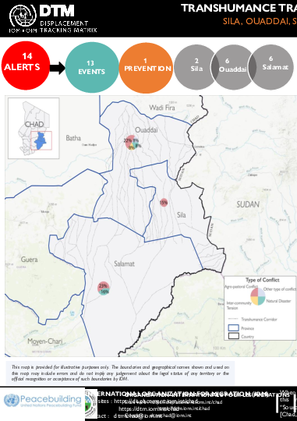-
Countries
-
Data and Analysis
-
Special Focus
-
Crisis Responses
Chad — Transhumance Tracking Tool Dashboard 1 (October – December 2022)

Contact
DTM Chad, DTMTchad@iom.int
Language
English
Location
Chad
Period Covered
Oct 01 2022
Dec 31 2022
Activity
- Survey
- Flow Monitoring
Chad is one of the largest livestock countries in Africa and has nearly 94 million head of livestock (Ministry of Livestock and Animal Resources, 2016). However, the mode of livestock farming is of the traditional extensive type, characterised by the mobility of animals in search of water and pasture (Madina A. Affadine, 2018). These resources are reducing in quantity and quality over time with the effects of climatic hazards and anthropic actions (UNDP et al, 2012). Thus, the strong pressure on resources tends to degrade the relationship between herders and farmers. Conflicts of use have become recurrent, on the one hand, between farmers and herders, and on the other, between the herders themselves. In order to better understand the dynamics of transhumance movements and their impact, IOM, through its Displacement Tracking Matrix (DTM), has set up the Transhumance Tracking Tool (TTT) with the network of the confederation of professional organisations of pastoralists and actors in the livestock sector in Chad (COPAFIB) and its branches of relay organisations for follow-up in the provinces of intervention.
The TTT makes it possible to understand the dynamics of transhumance in Chad in general, and more particularly in the east of the country in the provinces of Ouaddai, Salamat and Sila. Thus, this tool is based on three components: the early warning mechanism, counting of transhumance flows, surveys and mapping.
The main objective of the early warning system is to collect information on events related to natural disasters, agro-pastoral conflicts and the use of natural resources, to have an idea of existing conflict resolution methods, and to inform partners (state and non-governmental) as soon as possible about incidents and conflicts related to transhumance in order to prevent and/or manage them. This report presents the alert tool data collected by key informants during the months of October to December 2022 in the provinces of Ouaddai, Salamat and Sila.
